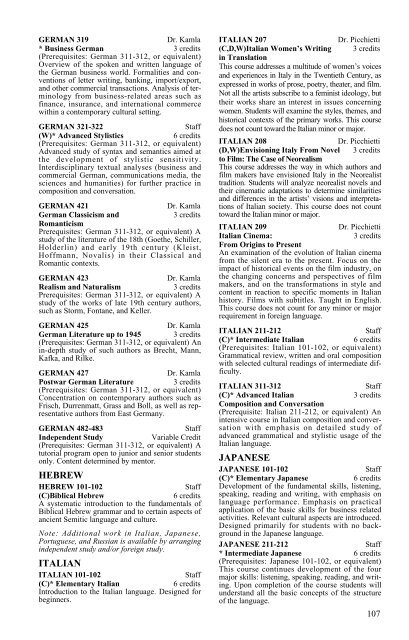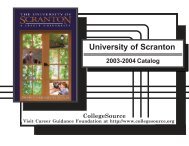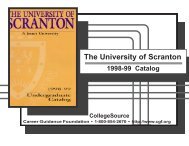You also want an ePaper? Increase the reach of your titles
YUMPU automatically turns print PDFs into web optimized ePapers that Google loves.
GERMAN 319 Dr. Kamla<br />
* Business German 3 credits<br />
(Prerequisites: German 311-312, or equivalent)<br />
Overview <strong>of</strong> the spoken and written language <strong>of</strong><br />
the German business world. Formalities and conventions<br />
<strong>of</strong> letter writing, banking, import/export,<br />
and other commercial transactions. Analysis <strong>of</strong> terminology<br />
from business-related areas such as<br />
finance, insurance, and international commerce<br />
within a contemporary cultural setting.<br />
GERMAN 321-322 Staff<br />
(W)* Advanced Stylistics 6 credits<br />
(Prerequisites: German 311-312, or equivalent)<br />
Advanced study <strong>of</strong> syntax and semantics aimed at<br />
the development <strong>of</strong> stylistic sensitivity.<br />
Interdisciplinary textual analyses (business and<br />
commercial German, communications media, the<br />
sciences and humanities) for further practice in<br />
composition and conversation.<br />
GERMAN 421 Dr. Kamla<br />
German Classicism and 3 credits<br />
Romanticism<br />
Prerequisites: German 311-312, or equivalent) A<br />
study <strong>of</strong> the literature <strong>of</strong> the 18th (Goethe, Schiller,<br />
Holderlin) and early 19th century (Kleist,<br />
H<strong>of</strong>fmann, Novalis) in their Classical and<br />
Romantic contexts.<br />
GERMAN 423 Dr. Kamla<br />
Realism and Naturalism 3 credits<br />
Prerequisites: German 311-312, or equivalent) A<br />
study <strong>of</strong> the works <strong>of</strong> late 19th century authors,<br />
such as Storm, Fontane, and Keller.<br />
GERMAN 425 Dr. Kamla<br />
German Literature up to 1945 3 credits<br />
(Prerequisites: German 311-312, or equivalent) An<br />
in-depth study <strong>of</strong> such authors as Brecht, Mann,<br />
Kafka, and Rilke.<br />
GERMAN 427 Dr. Kamla<br />
Postwar German Literature 3 credits<br />
(Prerequisites: German 311-312, or equivalent)<br />
Concentration on contemporary authors such as<br />
Frisch, Durrenmatt, Grass and Boll, as well as representative<br />
authors from East Germany.<br />
GERMAN 482-483 Staff<br />
Independent Study Variable Credit<br />
(Prerequisites: German 311-312, or equivalent) A<br />
tutorial program open to junior and senior students<br />
only. Content determined by mentor.<br />
HEBREW<br />
HEBREW 101-102 Staff<br />
(C)Biblical Hebrew 6 credits<br />
A systematic introduction to the fundamentals <strong>of</strong><br />
Biblical Hebrew grammar and to certain aspects <strong>of</strong><br />
ancient Semitic language and culture.<br />
Note: Additional work in Italian, Japanese,<br />
Portuguese, and Russian is available by arranging<br />
independent study and/or foreign study.<br />
ITALIAN<br />
ITALIAN 101-102 Staff<br />
(C)* Elementary Italian 6 credits<br />
Introduction to the Italian language. Designed for<br />
beginners.<br />
ITALIAN 207 Dr. Picchietti<br />
(C,D,W)Italian Women’s Writing 3 credits<br />
in Translation<br />
This course addresses a multitude <strong>of</strong> women’s voices<br />
and experiences in Italy in the Twentieth Century, as<br />
expressed in works <strong>of</strong> prose, poetry, theater, and film.<br />
Not all the artists subscribe to a feminist ideology, but<br />
their works share an interest in issues concerning<br />
women. Students will examine the styles, themes, and<br />
historical contexts <strong>of</strong> the primary works. This course<br />
does not count toward the Italian minor or major.<br />
ITALIAN 208 Dr. Picchietti<br />
(D,W)Envisioning Italy From Novel 3 credits<br />
to Film: <strong>The</strong> Case <strong>of</strong> Neorealism<br />
This course addresses the way in which authors and<br />
film makers have envisioned Italy in the Neorealist<br />
tradition. Students will analyze neorealist novels and<br />
their cinematic adaptations to determine similarities<br />
and differences in the artists’ visions and interpretations<br />
<strong>of</strong> Italian society. This course does not count<br />
toward the Italian minor or major.<br />
ITALIAN 209 Dr. Picchietti<br />
Italian Cinema: 3 credits<br />
From Origins to Present<br />
An examination <strong>of</strong> the evolution <strong>of</strong> Italian cinema<br />
from the silent era to the present. Focus on the<br />
impact <strong>of</strong> historical events on the film industry, on<br />
the changing concerns and perspectives <strong>of</strong> film<br />
makers, and on the transformations in style and<br />
content in reaction to specific moments in Italian<br />
history. Films with subtitles. Taught in English.<br />
This course does not count for any minor or major<br />
requirement in foreign language.<br />
ITALIAN 211-212 Staff<br />
(C)* Intermediate Italian 6 credits<br />
(Prerequisites: Italian 101-102, or equivalent)<br />
Grammatical review, written and oral composition<br />
with selected cultural readings <strong>of</strong> intermediate difficulty.<br />
ITALIAN 311-312 Staff<br />
(C)* Advanced Italian 3 credits<br />
Composition and Conversation<br />
(Prerequisite: Italian 211-212, or equivalent) An<br />
intensive course in Italian composition and conversation<br />
with emphasis on detailed study <strong>of</strong><br />
advanced grammatical and stylistic usage <strong>of</strong> the<br />
Italian language.<br />
JAPANESE<br />
JAPANESE 101-102 Staff<br />
(C)* Elementary Japanese 6 credits<br />
Development <strong>of</strong> the fundamental skills, listening,<br />
speaking, reading and writing, with emphasis on<br />
language performance. Emphasis on practical<br />
application <strong>of</strong> the basic skills for business related<br />
activities. Relevant cultural aspects are introduced.<br />
Designed primarily for students with no background<br />
in the Japanese language.<br />
JAPANESE 211-212 Staff<br />
* Intermediate Japanese 6 credits<br />
(Prerequisites: Japanese 101-102, or equivalent)<br />
This course continues development <strong>of</strong> the four<br />
major skills: listening, speaking, reading, and writing.<br />
Upon completion <strong>of</strong> the course students will<br />
understand all the basic concepts <strong>of</strong> the structure<br />
<strong>of</strong> the language.<br />
107
















